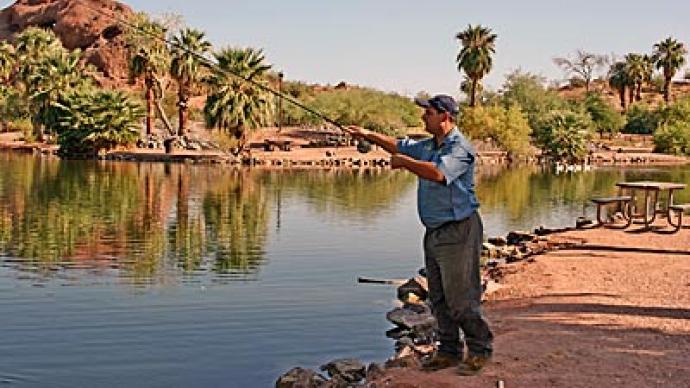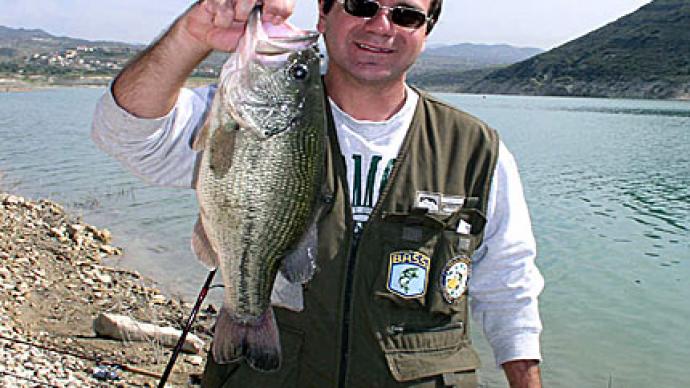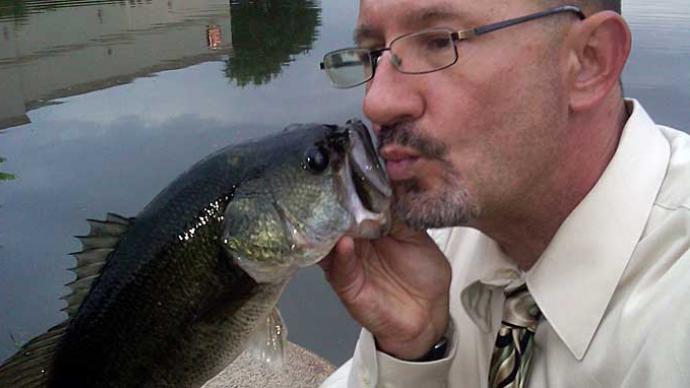
I'm a professional angler, and the rules don't allow me to fish from the bank in tournaments, yet I have done my share of bank fishing when I fish for them. Bank fishing is a great way to catch fish.
First, I locate an area that would suit the bass at the time of year I want to fish. Next, I look for areas with roughly a 30-degree slope running away from the shore. I like areas that run from 5 to 15 feet deep and have deep water adjacent to my chosen spot. If the slope is over 45 degrees, I avoid those areas.
On the other hand, I try and avoid flats as well. This is because too many snags are waiting in most flats for the bank angler.
The gradual slopes will attract bass, and those bass will usually stack up on such banks, especially if there is a little submerged brush and the slope is littered with chunk rock. I locate such banks by noticing the terrain above the water. Then, with a bit of imagination, I picture the underwater area.
My weapons from the bank include spinning tackle, for the most part. My favorite method is to splitshot a 4-inch Don lovino Worm. The splitshot should be as light -- #4 to #7 -- as you can get away with. I like to place the weight from 8 to 12 inches up from the hook. I use Berkley Big Game 8- to 12-pound test line depending on the brush and structure I have to contend with.
My arsenal includes a few crankbaits, a spinnerbait or two, and maybe even a Texas-rigged gitzit. I don't try to use a jig from the bank because it gets hung up too easily. I put all my tackle in a small box and place it inside the fish pouch of one of my old fly-fishing vests. It keeps everything together, and I don't have to drag along a big tackle box.
Once I've settled on my bait -- in this case, the 4-inch splitshot worm - I make a long cast straight out from my position. A rule of thumb is to be sure you can cast into at least 10 feet of water. Then, when the bait settles to the bottom, I drag it slowly up the slope. I can doodle and shake the bait as it comes back if needs be. Then I repeat the cast, adjusting my angle so I can fish the entire area in front of me. Some people call this "fan casting." A little 4-inch worm on a light spinning outfit has been my most successful rig from the bank in the spring.
Don't think, however, that there aren't other ways to catch bank fish. Depending on the time of year, crankbaits and topwaters work as well.
I generally wade into knee-deep water and throw my crank parallel to the bank. I like a #7 FatRap in a crawdad or shad color. I can keep the bait in the strike zone longer by standing in the water. I bang and bump the crank on the rocky slope and keep the bait in from 1 to 5 feet of water. This same method can be used with spinnerbaits or soft jerkbaits, depending on the forage.
Clothing color can be another critical factor in the success from the bank. Remember that from the perspective of fish, they see you against the background of whatever is on the shore: brush, trees, sage, rocks, whatever. I recommend wearing clothes that will blend in -- camouflage even. I don't believe you need to kneel or sneak up on bass as you might trout, but bass can hear your footsteps on the rocks. Go carefully, and if you can avoid walking along the bank you intend to fish, all the better.
Be aware, too, of your shadow. Don't allow the movements of your arms and body to give you away. Bass react to movements, and moving shadows can spook fish before you know it.
Bank fishing can make you a better angler by teaching you to be thorough. Too often, while in a boat, we make a few casts, maybe catch an active fish or two, and then run to the next spot. Being grounded forces you to fish each area completely and accurately. You can vary your cast a few degrees and cover a lot of water. There have been times that several fish have come out of an area that -- from the boater's perspective -- only deserved a few quick casts before moving on.
The next time you're out near some good water and your boat is back at home, throw in a spinning outfit and some tackle, and see how much fun it can be to catch bass without a boat. Hey, you never know. You just might get spoiled.
Reprinted with permission from Bass West Magazine




